

What is dependent origination? Dependent Origination a Core Teaching of Buddhism. Everything is interconnected.
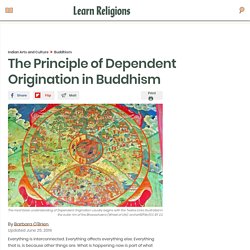
Everything affects everything else. Dependent Origination. The clockwork universe: is free will an illusion? Towards the end of a conversation dwelling on some of the deepest metaphysical puzzles regarding the nature of human existence, the philosopher Galen Strawson paused, then asked me: “Have you spoken to anyone else yet who’s received weird email?”

He navigated to a file on his computer and began reading from the alarming messages he and several other scholars had received over the past few years. Do We Have Free Will? Maybe It Doesn't Matter. Belief is a special kind of human power.
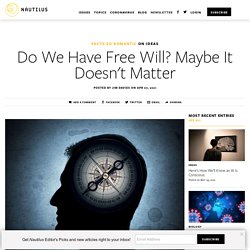
Agustin Fuentes, an anthropologist at the University of Notre Dame, eloquently claims as much in his recent book Why We Believe: Evolution and the Human Way of Being. It’s the “most prominent, promising, and dangerous capacity humanity has evolved,” he writes, the power to “see and feel and know something—an idea, a vision, a necessity, a possibility, a truth—that is not immediately present to the senses, and then to invest, wholly and authentically, in that ‘something’ so that it becomes one’s reality.” A great example of this is the widespread and intuitive idea that we have free will. Most people grow up with the notion that they are, in some sense, responsible for their thoughts and actions because, unlike animals, humans can think about their choices.
A neurocognitive view on the dimensions of Schadenfreude and envy. We usually think highly about ourselves, tending to believe that our prosocial nature prioritizes positive emotions about others.
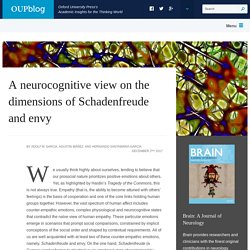
Yet, as highlighted by Hardin’s Tragedy of the Commons, this is not always true. Empathy (that is, the ability to become attuned with others’ feelings) is the basis of cooperation and one of the core links holding human groups together. However, the vast spectrum of human affect includes counter-empathic emotions, complex physiological and neurocognitive states that contradict the naïve view of human empathy.
Future - We’ve got human intelligence all wrong. Upcoming event The World-Changing Ideas Summit This story is part of a series inspired by the subjects and speakers appearing at BBC Future’s World-Changing Ideas Summit in Sydney on 15 November.

The Politics of Hate - Deep Inside the Red Brain. The Politics of Hate – Deep Inside the Red Brain.

System 2 reasoning (and a word about mindwandering) Most psychologists who study human reasoning have converged on some or other version of dual-systems theory.
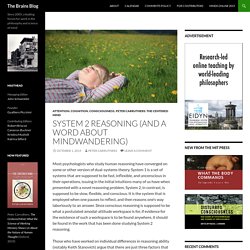
System 1 is a set of systems that are supposed to be fast, inflexible, and unconscious in their operations, issuing in the initial intuitions many of us have when presented with a novel reasoning problem. System 2, in contrast, is supposed to be slow, flexible, and conscious. It is the system that is employed when one pauses to reflect, and then reasons one’s way laboriously to an answer. Since conscious reasoning is supposed to be what a postulated amodal-attitude workspace is for, if evidence for the existence of such a workspace is to be found anywhere, it should be found in the work that has been done studying System 2 reasoning. You're not irrational, you're just quantum probabilistic: Researchers explain human decision-making with physics theory. The next time someone accuses you of making an irrational decision, just explain that you're obeying the laws of quantum physics.
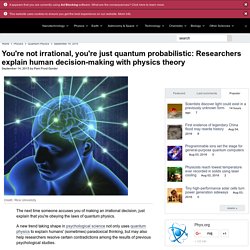
A new trend taking shape in psychological science not only uses quantum physics to explain humans' (sometimes) paradoxical thinking, but may also help researchers resolve certain contradictions among the results of previous psychological studies. According to Zheng Joyce Wang and others who try to model our decision-making processes mathematically, the equations and axioms that most closely match human behavior may be ones that are rooted in quantum physics.
Learning: The Mental State You Won't Believe Can Aid Understanding - PsyBlog. Caitlyn Jenner and Our Cognitive Dissonance - Issue 28: 2050. Somewhere in the middle of the night in a Central African rainforest, a chimpanzee gives birth.
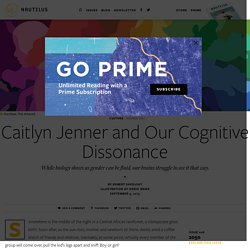
Soon after, as the sun rises, mother and newborn sit there, dazed, amid a coffee klatch of friends and relatives. Inevitably, at some point, virtually every member of the group will come over, pull the kid’s legs apart and sniff: Boy or girl? It’s the most binary question in biology, producing an answer that is set in stone. Study Can't Confirm Results Of Many Psychology Experiments. Why do we intuitively believe we have free will? It is perhaps the most famous experiment in neuroscience.

In 1983, Benjamin Libet sparked controversy with his demonstration that our sense of free will may be an illusion, a controversy that has only increased ever since. Libet’s experiment has three vital components: a choice, a measure of brain activity and a clock. The choice is to move either your left or right arm. In the original version of the experiment this is by flicking your wrist; in some versions of the experiment it is to raise your left or right finger. Libet’s participants were instructed to “let the urge [to move] appear on its own at any time without any pre-planning or concentration on when to act”.
The measure of brain activity is taken via electrodes on the scalp. The clock is specially designed to allow participants to discern sub-second changes. Putting these ingredients together, Libet took one extra vital measurement. How Thinking Works: 10 Brilliant Cognitive Psychology Studies Everyone Should Know. How experts think, the power of framing, the miracle of attention, the weird world of cognitive biases and more… Fifty years ago there was a revolution in psychology which changed the way we think about the mind. The ‘cognitive revolution’ inspired psychologists to start thinking of the mind as a kind of organic computer, rather than as an impenetrable black box which would never be understood.
This metaphor has motivated psychologists to investigate the software central to our everyday functioning, opening the way to insights into how we think, reason, learn, remember and produce language. Here are 10 classic cognitive psychology studies that have helped reveal how thinking works. INFOGRAPHIC: How Broadcasting Happiness Fuels Success. The Cheerleader Effect: Why People Appear Better-Looking in Groups. In the study, people’s faces were shown to participants either alone or in group photos. How Do We Hold a Child’s Mind Accountable? We humans are a morally messy species, constantly jostling one another at the marketplace of desires. But we also have built-in restraints. One-Minute Personality Test: How Open To Experience Are You? The Creativity Secret That Most People Don't Know. Creativity study reveals an unexpected tip. The more you consciously think, the less creative you are, a new study finds.
The researchers had people playing ‘Pictionary’, a game where you have to try and draw a word. At the same time their brains were scanned to see which areas were most active, and when. Professor Allan Reiss, one of the study’s authors, explained the results: “We found that activation of the brain’s executive-control centers — the parts of the brain that enable you to plan, organize and manage your activities — is negatively associated with creative task performance.Creativity is an incredibly valued human attribute in every single human endeavor, be it work or play.In art, science and business, creativity is the engine that drives progress.As a practicing psychiatrist, I even see its importance to interpersonal relationships.People who can think creatively and flexibly frequently have the best outcomes.”
ProjectImplicit. Anger Management Failures. Why This Beautiful Human Behaviour is Highly Infectious. The wonderful human behaviour that elevates all our morals. Acts of kindness can spread surprisingly easily between people — just by observing someone else being generous. They activate parts of the brain involved in motivating action and of social engagement, a new study finds. In turn we are also more likely to ‘pay it forward’. Scientists call this the ‘moral elevation’ effect. The first evidence from the lab of this effect was found in 2010.
Researchers at the University of California, San Diego and Harvard demonstrated moral elevation by having people playing a simple ‘giving’ game in the lab. Theconversation. “One doesn’t expect Dr Frankenstein to show up in a wool sweater,” wrote political commentator Charles Krauthammer, ominously, in the March 1997 issue of Time magazine. He was referring to British scientist Dr Ian Wilmut, who eight months earlier had successfully created Dolly, the world’s most famous sheep, by cloning her from another adult sheep’s cell. Less zen, but more efficient: How the digital age is really affecting our brains.
How Your Brain Decides Without You - Issue 19: Illusions. Man Thinking About Just Packing Up And Making Exact Same Mistakes Someplace Far Away. 10 Most Brilliant Social Experiments. TED Radio Hour: Barry Schwartz: Does Having Options Make Us Happier? Psychopath vs. Empath: the War Between Truth and Deception. Facing Disturbing Truths About Pedophilia Could Help Us Keep Kids Safer. An Incomplete Loop: A Review of Nir Eyal's Hooked. Personality Test Site. Personality Test - Keirsey Temperament Website. The Psychology of Color in Marketing. Things that shouldn't still exist. Obedience - Marry a Stranger.
What a Shaman Sees in A Mental Hospital. Here’s The Real Secret to Detecting Lies (And It’s Not Body Language) The 12 cognitive biases that prevent you from being rational. Faculty.virginia.edu/haidtlab/jost.glaser.political-conservatism-as-motivated-social-cog.pdf. Scientists Discover the Fascinating Psychological Reason Why Conservatives Are…Conservative. Free will could be the result of 'background noise' in the brain, study suggests - Science - News. Looking for the best strategy? Ask a chimp. Are you a psychopath? Is Free Thinking A Mental Illness? Intuition and analytical skills matter most in a crisis. Another Partisan Divide: Mitt Romney's Looks : It's All Politics. Being Suicidal: What it feels like to want to kill yourself. Timothy Leary's MIND MIRROR Computer Game.
Want to Make Hunter-Gatherers Irrational? Expose Them to Free Markets. Sarcasm Detectors: Empathetic Kids Are Better at It. Motivated reasoning: Fuel for controversies, conspiracy theories and science denialism alike. A Triple Bill of Deception. Knowing How to Change Your Mind: A Three Minute Guide to Bayesian Reasoning. The Brain on Trial - David Eagleman. Milgram experiment. Paul Ekman: Outsmart Evolution and Master Your Emotions. It's Heartbreaking To See How People React To The First Half Of His Test Compared To The Second. Impactful Distraction. Q&A With 'Tampa' Author Alissa Nutting. The Mind of a Killer: Eric Harris, Seung Hui Cho, Gill, and Breivik.
Why good deeds don’t go unpunished. Today's Big Idea. Would You Kill Baby Hitler (And Other Psychopathic Musings)? Psychopaths: Born evil or with a diseased brain? Stephen Farrow 'the psychopath' Psychopathic criminals have empathy switch. Inside the Mind of a Sociopath. How to spot a sociopath - 10 red flags that could save you from being swept under the influence of a charismatic nut job. Embarrassment. Mindscapes: First interview with a dead man - health - 23 May 2013. The Brain as Filter: On Removing the Stuffing from the Keyhole.
Less is more for smart perception. People Getting Dumber? Human Intelligence Has Declined Since Victorian Era, Research Suggests. The Psychology of Authority. Pedophiles identified accurately with implicit association tasks. Researchers suggest conformity pressure and desire to keep-up is pushing unsustainable population growth. Ego Depletion. NASA Faked the Moon Landing—Therefore, (Climate) Science Is a Hoax. New Research: The Psychology of Conspiracy Theorists and Climate Change Deniers. Strong personalities are weak when faced with change. Eight trends that will govern us. How we Choose Fragrance and Spring Perfume Moods. The Nation's Oldest College Science Publication – Cultural Cognition and Scientific Consensus. Double bind. 'What You're Doing Is Weird And Wrong,' Small Voice In Back Of Kim Jong-Un's Head Reports. Rats do tasks while connected brain-to-brain. Rat 'Mind Melds' May Point Way To Long-Distance Brain-To-Brain Communication.
Chemosignals Communicate Human Emotions. A retrospective editing of consciousness. 12 Scientific Reasons Human Beings Are Wildly Irrational. Maps provide "most detailed look ever" at how the brain organizes visual information. Your brain has at least four different senses of location. The Opposite of Thinking - David Rothkopf. Nazis weren't just following orders but 'took pride' in atrocities. The Science of Lucid Dreaming. How the negative trumps the positive in politics. More easily influenced when we follow our heart.